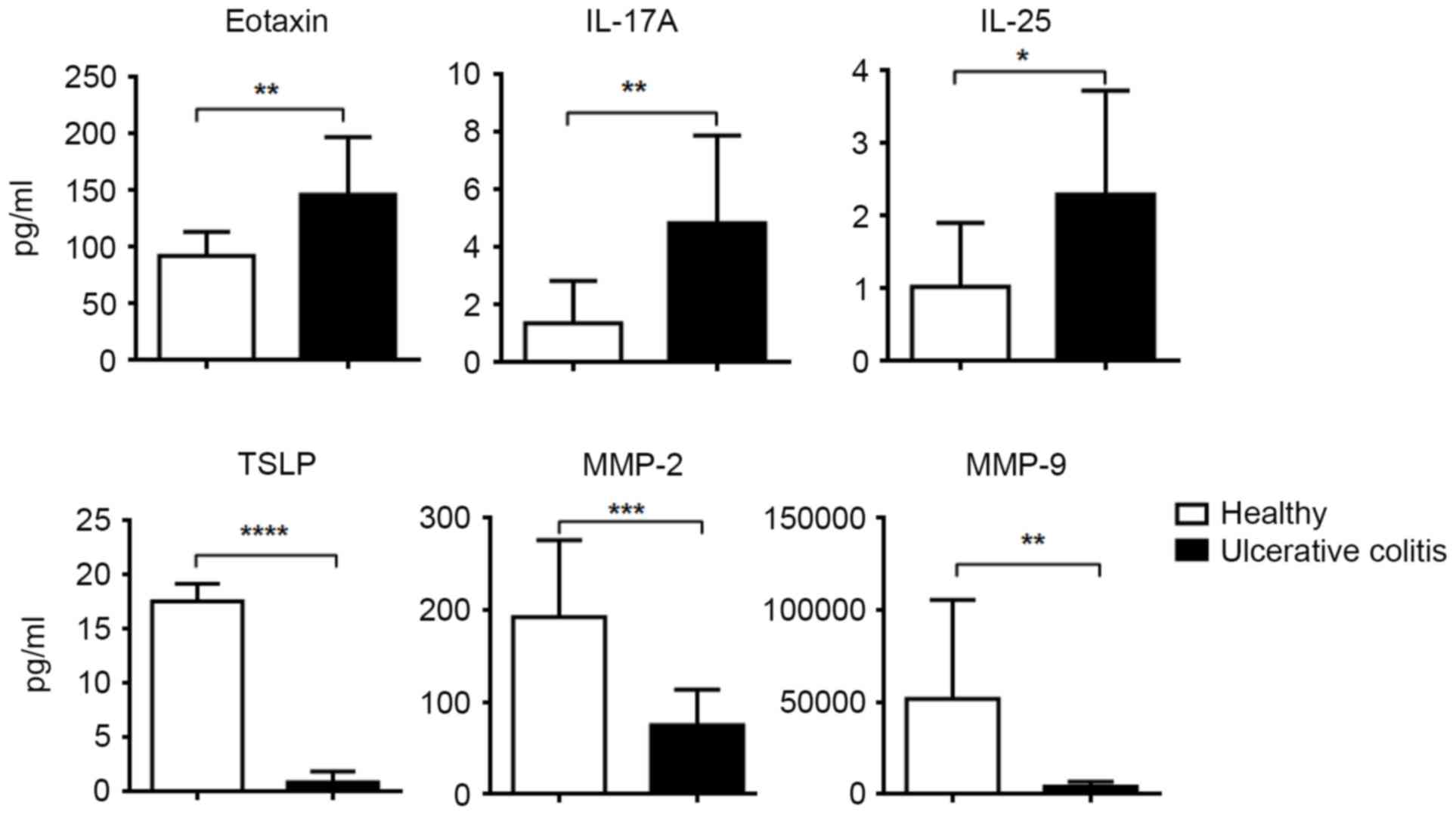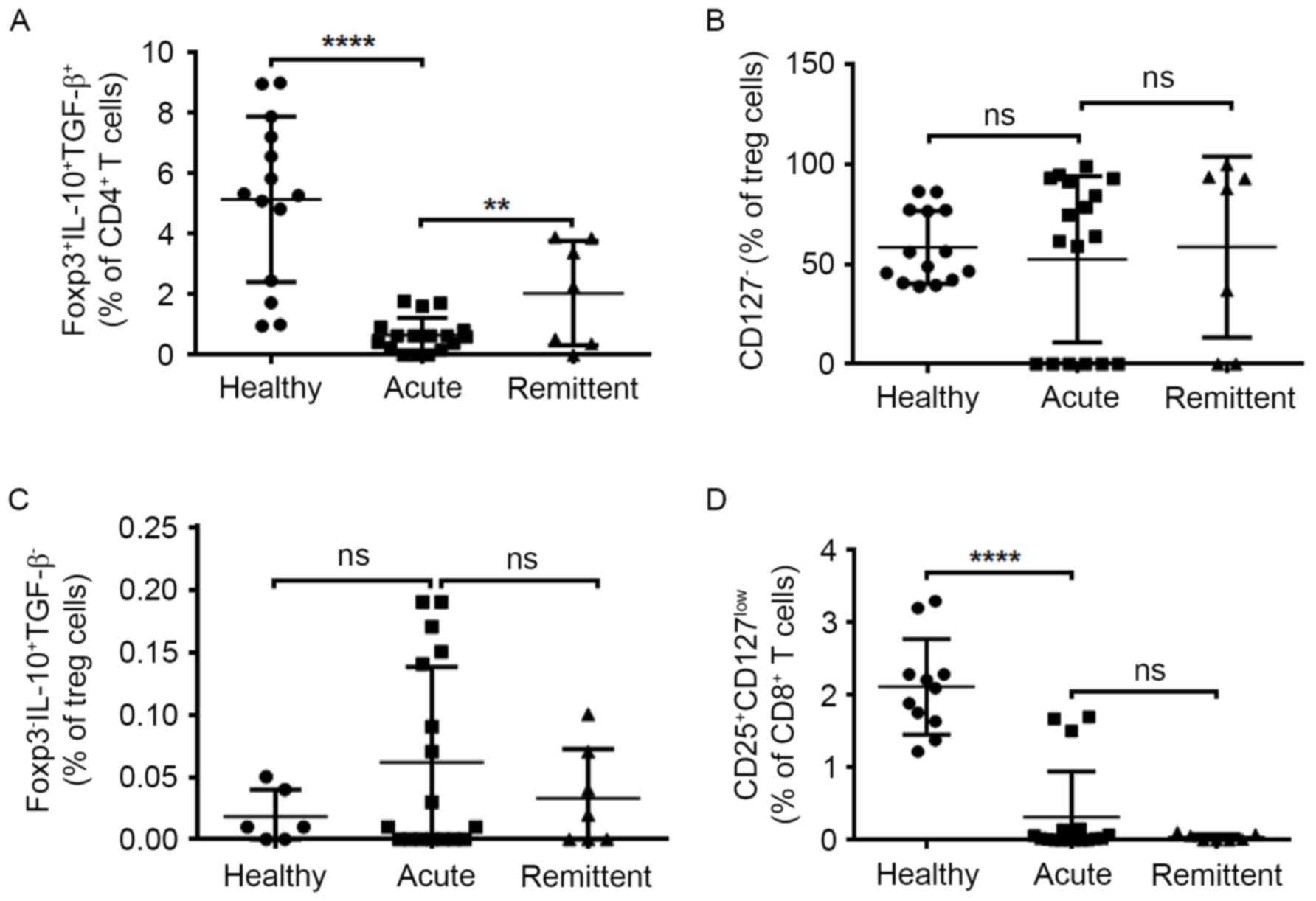|
1
|
Dixon LJ, Kabi A, Nickerson KP and
McDonald C: Combinatorial effects of diet and genetics on
inflammatory bowel disease pathogenesis. Inflamm Bowel Dis.
21:912–922. 2015. View Article : Google Scholar : PubMed/NCBI
|
|
2
|
Giusti S, Tani U and Neri E: Inflammatory
bowel diseasesCT Colonography Atlas. Springer; pp. 75–83. 2013,
View Article : Google Scholar
|
|
3
|
Baumgart DC and Sandborn WJ: Inflammatory
bowel disease: Clinical aspects and established and evolving
therapies. Lancet. 369:1641–1657. 2007. View Article : Google Scholar : PubMed/NCBI
|
|
4
|
Jostins L, Ripke S, Weersma RK, Duerr RH,
McGovern DP, Hui KY, Lee JC, Schumm LP, Sharma Y, Anderson CA, et
al: Host-microbe interactions have shaped the genetic architecture
of inflammatory bowel disease. Nature. 491:119–124. 2012.
View Article : Google Scholar : PubMed/NCBI
|
|
5
|
Knights D, Lassen KG and Xavier RJ:
Advances in inflammatory bowel disease pathogenesis: Linking host
genetics and the microbiome. Gut. 62:1505–1510. 2013. View Article : Google Scholar : PubMed/NCBI
|
|
6
|
Round JL and Mazmanian SK: The gut
microbiota shapes intestinal immune responses during health and
disease. Nat Rev Immunol. 9:313–323. 2009. View Article : Google Scholar : PubMed/NCBI
|
|
7
|
Li L, Shi QG, Lin F, Liang YG, Sun LJ, Mu
JS, Wang YG, Su HB, Xu B, Ji CC, et al: Cytokine IL-6 is required
in Citrobacter rodentium infection-induced intestinal Th17
responses and promotes IL-22 expression in inflammatory bowel
disease. Mol Med Rep. 9:831–836. 2014.PubMed/NCBI
|
|
8
|
Troncone E, Marafini I, Pallone F and
Monteleone G: Th17 cytokines in inflammatory bowel diseases:
Discerning the good from the bad. Int Rev Immunol. 32:526–533.
2013. View Article : Google Scholar : PubMed/NCBI
|
|
9
|
Jiang WY, Zhang XF and Zhang HJ: Elevated
levels of Th17 cells and Th17-related cytokines in patients with
inflammatory bowel disease. J Gastroenterol Hepatol. 28:368.
2013.
|
|
10
|
Lim SM, Jeong JJ, Choi HS, Chang HB and
Kim DH: Mangiferin corrects the imbalance of Th17/Treg cells in
mice with TNBS-induced colitis. Int Immunopharmacol. 34:220–228.
2016. View Article : Google Scholar : PubMed/NCBI
|
|
11
|
Omenetti S and Pizarro TT: The Treg/Th17
Axis: A dynamic balance regulated by the gut microbiome. Front
Immunol. 6:6392015. View Article : Google Scholar : PubMed/NCBI
|
|
12
|
Fantini MC, Rizzo A, Fina D, Caruso R,
Becker C, Neurath MF, Macdonald TT, Pallone F and Monteleone G:
IL-21 regulates experimental colitis by modulating the balance
between Treg and Th17 cells. Eur J Immunol. 37:3155–3163. 2007.
View Article : Google Scholar : PubMed/NCBI
|
|
13
|
Yamada A, Arakaki R, Saito M, Tsunematsu
T, Kudo Y and Ishimaru N: Role of regulatory T cell in the
pathogenesis of inflammatory bowel disease. World J Gastroenterol.
22:2195–2205. 2016.PubMed/NCBI
|
|
14
|
Chen Y, Sun R, Wu X, Cheng M, Wei H and
Tian Z: CD4+CD25+Regulatory T cells inhibit natural killer cell
hepatocytotoxicity of hepatitis B virus transgenic mice via
membrane-bound TGF-β and OX40. J Innate Immun. 8:30–42. 2016.
View Article : Google Scholar : PubMed/NCBI
|
|
15
|
Langenhorst D, Gogishvili T, Geyer B and
Hunig T: Regulation of IL-10 production in ‘natural’ regulatory T
cells. Wien Klin Wochen. 120:170. 2008.
|
|
16
|
Lord JD, Shows DM, Chen J and Thirlby RC:
Human blood and mucosal regulatory T cells express activation
markers and inhibitory receptors in inflammatory bowel disease.
PLoS One. 10:e01364852015. View Article : Google Scholar : PubMed/NCBI
|
|
17
|
Verhagen J and Wraith DC: Antigen-specific
iTreg cells require both IL-10 and CTLA-4 to control autoimmune
disease. Immunology. 140:140. 2013.
|
|
18
|
Singh A, Seavey C, Horvath K and Mohiuddin
M: Induced T regulatory (iTreg) cells suppress T and B cell immune
responses. Xenotransplantation. 18:271–272. 2011.
|
|
19
|
Haribhai D, Chatila TA and Williams CB:
Immunotherapy with iTreg and nTreg cells in a murine model of
inflammatory bowel disease. Methods Mol Biol. 1422:197–211. 2016.
View Article : Google Scholar : PubMed/NCBI
|
|
20
|
Schmitt EG, Haribhai D, Williams JB,
Aggarwal P, Jia S, Charbonnier LM, Yan K, Lorier R, Turner A,
Ziegelbauer J, et al: IL-10 produced by induced regulatory T cells
(iTregs) controls colitis and pathogenic Ex-iTregs during
immunotherapy. J Immunol. 189:5638–5648. 2012. View Article : Google Scholar : PubMed/NCBI
|
|
21
|
Rifa'i M, Kawamoto Y, Nakashima I and
Suzuki H: Essential roles of CD8+CD122+ regulatory T cells in the
maintenance of T cell homeostasis. J Exp Med. 200:1123–1134. 2004.
View Article : Google Scholar : PubMed/NCBI
|
|
22
|
Jebbawi F, Fayyad-Kazan H, Merimi M,
Lewalle P, Verougstraete JC, Leo O, Romero P, Burny A, Badran B,
Martiat P and Rouas R: A microRNA profile of human CD8(+)
regulatory T cells and characterization of the effects of microRNAs
on Treg cell-associated genes. J Transl Med. 12:2182014. View Article : Google Scholar : PubMed/NCBI
|
|
23
|
Ménager-Marcq I, Pomié C, Romagnoli P and
van Meerwijk JP: CD8+CD28- regulatory T lymphocytes prevent
experimental inflammatory bowel disease in mice. Gastroenterology.
131:1775–1785. 2006. View Article : Google Scholar : PubMed/NCBI
|




















